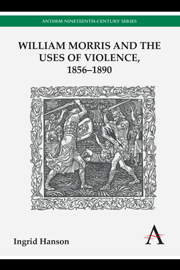Book contents
- Frontmatter
- Contents
- Acknowledgements
- Introduction Warriors Waiting for the Word
- Chapter One The Early Romances and the Transformative Touch of Violence
- Chapter Two Knightly Women and the Imagination of Battle in The Defence of Guenevere, and Other Poems
- Chapter Three Sigurd the Volsung and the Parameters of Manliness
- Chapter Four Crossing the River of Violence: The Germanic Antiwars and the Uncivilized Uses of Work and Play
- Chapter Five ‘All for the Cause’: Fellowship, Sacrifice and Fruitful War
- Afterword ‘Hopeful Strife and Blameless Peace’
- Notes
- Bibliography
- Index
Chapter Four - Crossing the River of Violence: The Germanic Antiwars and the Uncivilized Uses of Work and Play
Published online by Cambridge University Press: 05 July 2013
- Frontmatter
- Contents
- Acknowledgements
- Introduction Warriors Waiting for the Word
- Chapter One The Early Romances and the Transformative Touch of Violence
- Chapter Two Knightly Women and the Imagination of Battle in The Defence of Guenevere, and Other Poems
- Chapter Three Sigurd the Volsung and the Parameters of Manliness
- Chapter Four Crossing the River of Violence: The Germanic Antiwars and the Uncivilized Uses of Work and Play
- Chapter Five ‘All for the Cause’: Fellowship, Sacrifice and Fruitful War
- Afterword ‘Hopeful Strife and Blameless Peace’
- Notes
- Bibliography
- Index
Summary
In The House of the Wolfings (1888) and The Roots of the Mountains (1889) Morris tells stories of the victorious battles of the ancient Goths, in archaic language that is vivid and celebratory, evoking not only the communalism and harmony of Teutonic society but also its commitment to martial violence. The burgeoning civilization of the Romans, in Wolfings, and the rapacious cruelty of the fictional Dusky Men, in Roots, are set in contrast to the committed harmonious warfare of the Goths. Just as the Marxist socialism that Morris embraced from 1883 onwards sought not to modify capitalism, but to overthrow it, so in these texts the Romans and the Dusky Men must be utterly defeated by the barbarians – temporarily, at least. As Face-of-god says in Roots, ‘There can be no two words concerning what we have to aim at; these Dusky Men we must slay everyone, though we be fewer than they be’ (Roots, 248). Five years before Roots was published, Morris had said in a lecture, ‘Misery and the Way Out’: ‘this earthly hell is not the ordinance of nature but the manufacture of man […] and it is your business to destroy it: to destroy it, I say, […] to make an end of it so that no one henceforth can ever fall into it’. This chapter will suggest that the romances, written more than ten years after Sigurd and at a time when Morris's political activism was fervent but beset by difficulties, demonstrate his literary commitment to absolute war, and to the imaginative annihilation of a thoroughly evil enemy.
- Type
- Chapter
- Information
- William Morris and the Uses of Violence, 1856–1890 , pp. 97 - 130Publisher: Anthem PressPrint publication year: 2013



